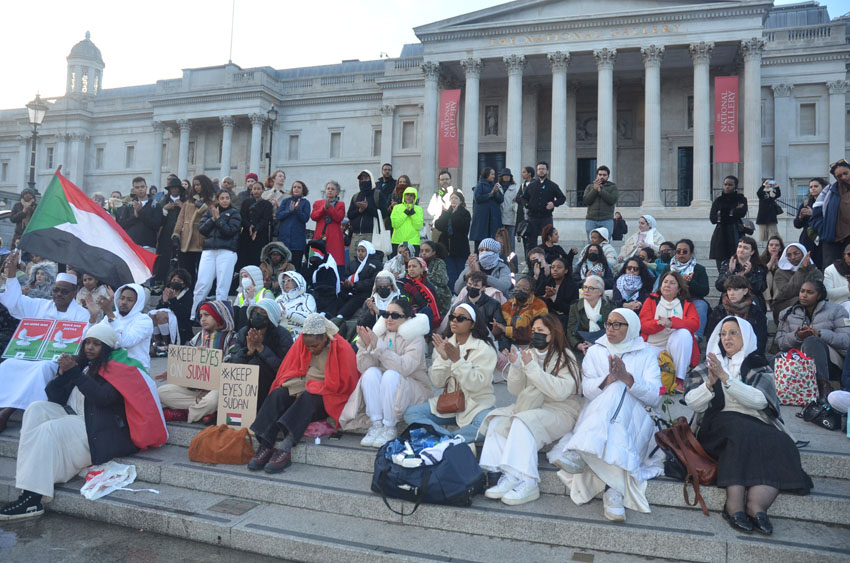Statement issued on Monday from the London for Sudan community organisation:
National Call for Action: UK Complicity and Lack of Media Attention Protest for Sudan
LONDON for Sudan is organising a protest in central London to raise awareness and address the UK’s role in the war on civilians in Sudan, holding them accountable for their complicity in the world’s biggest humanitarian crisis.
The protest aims to also address the lack of media attention surrounding Sudan and to show solidarity with the Sudanese people amidst the ongoing conflict rooted in struggles over resources and wealth that emerged after the 2018 revolution.
This devastating crisis in Sudan has resulted in the deaths of thousands, the displacement of millions, and a pressing need for humanitarian assistance for 25 million people.
The conflict between the Sudanese Armed Forces (SAF) and Rapid Support Forces (RSF) militia has caused widespread damage, human rights abuses, sexual violence, and killings of civilians, escalating the crisis.
Efforts for peace talks have been unsuccessful as civilian casualties continue, particularly in regions like Khartoum, Jezira state, Kordofan, El-Geneina, and Al Fasher, where ethnic cleansing reports are emerging, highlighting the atrocities faced by many marginalised communities. The crisis in Sudan Should be international news.
The details of the demonstration are as follows:
Date and Time: Saturday, May 11th 12:00pm
Route: The march will commence at BBC, Broadcasting House and conclude at 10 Downing Street.
The UK government is facing accusations of complicity in human rights abuses in Sudan due to providing military support and training. Sudanese human rights lawyer Ali Agab Nour, now a refugee in the UK, is challenging the government’s actions in court, claiming that the decision-making process leading to military assistance was unlawful.
Despite Ministry of Defence assertions of correct risk assessments, Nour argues that strengthening the Sudanese military’s capacity through British assistance may perpetuate human rights abuses such as mass rape and ethnic cleansing, particularly in regions like Darfur.
The UK’s Defence Engagement Sudan programme has seen £2.2 million spent on defence training for Sudanese forces, drawing criticism for enabling abuses and contravening the government’s own policies on human rights protection.
The UK Foreign Office has also been accused of ignoring warnings about the impending conflict and mass atrocities in Sudan, as violence between rival generals escalates.
The accusations, made by the Atrocity Prevention Working Group, highlight a lack of expertise, systems, and policies focused on preventing atrocities in Sudan.
The group warns that the current violence could be even worse than the Darfur genocide, pointing to a failure to respond to escalating violence and instability.
The Foreign Office’s optimistic approach of prioritising democracy in Sudan has been criticised, with concerns raised about the lack of preparation for potential violence and atrocities.
We are urging the UK government to acknowledge its mistakes and prioritise justice and accountability in response to the crisis in Sudan.
Despite drawing attention to conflicts in Gaza and Ukraine, the brutal war in Sudan, which has resulted in over 15,000 deaths and displacement of over 10 million people, has received little international coverage.
The conflict between the Sudanese Armed Forces and the Rapid Support Forces, engaging in violent campaigns of ethnic cleansing, has been deemed one of the worst humanitarian crises in recent history by the United Nations.
However, media coverage and public awareness of the crisis have been lacking, with minimal funding for humanitarian aid, reflecting a failure in informing the public of crucial global events.
The media’s role in shedding light on such atrocities is crucial, yet the limited coverage of Sudan’s crisis exemplifies a broader issue in prioritising certain conflicts over others, leading to a lack of effective response and potential escalation of violence.
This can be echoed by the UN relief chief, who tells the media ‘very, very difficult to get attention to Sudan.
‘In my view, it is a place of as great a suffering as anywhere in the world today. It’s simply also a threat to the stability of the wider region – not just the immediate region, but beyond. And the lack of access for us, is very, very considerable.
‘So, we were trying to reach, we have a plan for $2.7 billion for this year, 2024. Last year, we were about 40 per cent funded. We hope to do better this year. We’re trying to help 17.4 million people with these two plans. The one that I’m responsible for, also has half of the population – 25 million people need assistance and half of them are children.
‘So, it’s extraordinarily grave and it’s a place, where there has been no schooling for kids since, in this last nine months, ten months. Hospitals have been destroyed. There’s been an epidemic of attacks on health institutions, looting, many of your warehouses, by the parties.’
It is our duty to to increase efforts to raise awareness, support local organisations, advocate for ceasefires, and provide critical aid are essential in ensuring that the crisis in Sudan receives the attention and assistance necessary to alleviate the suffering of individuals and families impacted by this conflict.
At the protest, attendees will listen to a variety of speakers, from Sudanese individuals recounting personal experiences to political figures addressing geopolitical intricacies. The speakers will shed light on the hurdles facing Sudan, such as persistent conflicts, disease outbreaks, violence against vulnerable groups, economic and political instability, and environmental crises.
Additionally, cultural performances and uplifting speeches will urge attendees to take immediate action, emphasising the urgent need to end the war to alleviate suffering and achieve peace.
